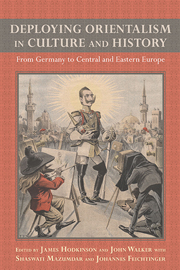Book contents
- Frontmatter
- Contents
- Preface
- Introduction
- 1 (Re)translating the West: Humboldt, Habermas, and Intercultural Dialogue
- 2 Friedrich Schlegel's Writings on India: Reimagining Germany as Europe's True Oriental Self
- 3 Germany's Local Orientalisms
- 4 Tales from the Oriental Borderlands: On the Making and Uses of Colonial Algiers in Germanophone Travel Writing from the Maghreb around 1840
- 5 The Jew, the Turk, and the Indian: Figurations of the Oriental in the German-Speaking World
- 6 M. C. Sprengel's Writings on India: A Disenchanted and Forgotten Orientalism of the Late Eighteenth Century
- 7 Occident and Orient in Narratives of Exile: The Case of Willy Haas's Indian Exile Writings
- 8 Distant Neighbors: Uses of Orientalism in the Late Nineteenth-Century Austro-Hungarian Empire
- 9 Modes of Orientalism in Hungarian Letters and Learning of the Nineteenth and Twentieth Centuries
- 10 Where the Orient Ends? Orientalism and Its Function for Imperial Rule in the Russian Empire
- 11 Noncolonial Orientalism? Czech Travel Writing on Africa and Asia around 1918
- 12 Oriental Sexuality and Its Uses in Nineteenth-Century Travelogues
- Notes on the Contributors
- Index
10 - Where the Orient Ends? Orientalism and Its Function for Imperial Rule in the Russian Empire
Published online by Cambridge University Press: 05 December 2013
- Frontmatter
- Contents
- Preface
- Introduction
- 1 (Re)translating the West: Humboldt, Habermas, and Intercultural Dialogue
- 2 Friedrich Schlegel's Writings on India: Reimagining Germany as Europe's True Oriental Self
- 3 Germany's Local Orientalisms
- 4 Tales from the Oriental Borderlands: On the Making and Uses of Colonial Algiers in Germanophone Travel Writing from the Maghreb around 1840
- 5 The Jew, the Turk, and the Indian: Figurations of the Oriental in the German-Speaking World
- 6 M. C. Sprengel's Writings on India: A Disenchanted and Forgotten Orientalism of the Late Eighteenth Century
- 7 Occident and Orient in Narratives of Exile: The Case of Willy Haas's Indian Exile Writings
- 8 Distant Neighbors: Uses of Orientalism in the Late Nineteenth-Century Austro-Hungarian Empire
- 9 Modes of Orientalism in Hungarian Letters and Learning of the Nineteenth and Twentieth Centuries
- 10 Where the Orient Ends? Orientalism and Its Function for Imperial Rule in the Russian Empire
- 11 Noncolonial Orientalism? Czech Travel Writing on Africa and Asia around 1918
- 12 Oriental Sexuality and Its Uses in Nineteenth-Century Travelogues
- Notes on the Contributors
- Index
Summary
In Orientalism, Edward Said fiercely criticized what he saw as the complicity of academic oriental studies with the colonial projects of the British, French, and American Empires. However, a few years before Said, certain Western historians of the Russian Empire had already begun to scrutinize the complex relationship between the Russian center and the residents of its Asian colonies. One important example was the anthology Russia and Asia, edited by the American historian Wayne Vucinich in 1972. Because of its subtitle—Essays on the Influence of Russia on the Asian Peoples—this volume seemed to describe the Russian-Asian colonial encounter as a one-way street toward the peripheries, in which the mutual influence between the colonizers and the colonized played only a subordinate role. But this first impression was deceptive, because the articles explained the profound Asian influences on the Russian side as well. A couple of years before the first publication of Orientalism these authors had observed the Russian scholarly gaze on the oriental other in a Saidian way, and gone even further than Said by exploring the mutual interplay between the colonizers and the colonized.
In spite of the manifold criticism of Orientalism, Said's work inspired many historians of the Russian Empire in the next decades. Thus numerous books—mostly in English—on the Russian-Asian encounter were published. Their authors not only discussed the concept of “orientalism” critically, but also extended the perspective by examining the reciprocity of the Russian-oriental relationship.
- Type
- Chapter
- Information
- Deploying Orientalism in Culture and HistoryFrom Germany to Central and Eastern Europe, pp. 190 - 208Publisher: Boydell & BrewerPrint publication year: 2013



